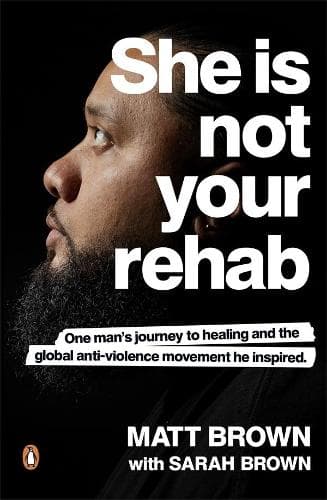Review: She is Not Your Rehab: One man’s journey to healing and the global anti-violence movement he inspired
Reviewed by Greg Fleming
Like many of us Mataio (Matt) Faafetai Malietoa Brown went to see the film Once Were Warriors when it opened in 1994. Brown, now an internationally acclaimed Christchurch barber who often reaches out to men struggling with mental health issues while they sit in his barber’s chair, recounts how he and his brothers watched the beating Jake the Muss gave to his wife and laughed.
They presumed the movie was a comedy, deciding that Beth’s desperate attempts to hide were “nothing compared with what our Mother received regularly from our Father.” It’s just one of many moments in this tough, but inspiring, book that brings the reader face-to-face with the enduring effects of abuse and domestic violence.
Brown’s approach is not to judge or blame but to connect with the men who perpetrate it:
“Half the time, with the men I’m speaking with, I don’t actually think they are really angry. Their anger is just a secondary emotion which is easier to deal with than what is causing it.”
It’s a book he wrote “on behalf of every kid who ever lived in a home of violence and abuse” and, sadly, there’s few as qualified to pen it as Brown. He comes from a large Polynesian family of three older half-sisters and four brothers. They grew up in a three bedroom state house in one of Christchurch’s toughest neighbourhoods.
His father either worked a series of low paying jobs, was in jail or just absent. When he was at home his temper operated on a "trigger wire“ and anything could set him off. When he was drunk - which was often - the violence would start. Brown recounts one incident when his father followed his mother out into the street and punched her in the face in full view of their neighbours. Nobody said a word.
Brown also recounts how, as a teen, he suffered abuse at the hands of a teacher at a Catholic school and then an uncle. He coped for a while by masking it - using music, art and video games as a shield to shut the world out - but knew deep down he needed help. He finally reached out to a youth worker and was heard.
That led to him leaving home at 15 and starting a voyage of recovery and self-empowerment that has seen him add in-demand speaker, author and leader of an anti-violence movement, as well as barber, to his CV.
Don’t mistake this for a misery memoir; Brown’s delving into his past is a vital tool to engage his audience — men like himself who have been moulded and conditioned by a toxic upbringing.
The aim is to stop that contaminating their relationship with their partners (hence the title), their children and themselves.
Brown talks candidly about his relationship with his wife Sarah, outlining how she challenged some of the toxic behaviour he carried from his upbringing: “We’ve been unloading our baggage, like we’re at the airport terminal and she’s the carousel on which we can dump our stuff…”
The work is ongoing but has its rewards: “When life knocks me down and gives me a lesson that… feels like I’m stuck in the middle of the Pacific Ocean drowning, it’s her swimming right next to me, telling me to keep my head up.”
Brown has a natural gift for storytelling - check out his moving Ted Talk on YouTube The Barbershop Where Men Go To Heal - but here Brown goes deeper and offers practical steps to men in need. There are helpful bullet point tips, coping tools and support information, but it’s his own story of hard-won triumph and those he relates from his barber shop clients that make this book so compelling.
Of course, abuse is an issue that cuts across class and backgrounds. Brown describes one man who stopped his wife from taking promotions because her success made him feel inferior. Brown pays him a visit after his wife finally plucks up the courage to leave with the kids. Despite his initial bravado, within a few minutes the man is sobbing onto Brown’s shoulder, recounting a familiar tale of an absent, or remote, father and the lasting impact that can have.
In a similar hands-on manner Brown often directly addresses the reader, urging them to take responsibility for both their actions and their recovery: “You are no longer that little boy stuck in the cupboard, but now a Man/Father/Partner who is responsible for your own healing and future. Do you want to stay a moment longer than you need to in the cupboard of fear/ anger/frustration/rage?”
And, as Brown well knows, a vital part of that healing involves forgiveness. When Brown opened the barbershop in 2014, his first customer was his father.
Reviewed by Greg Fleming
